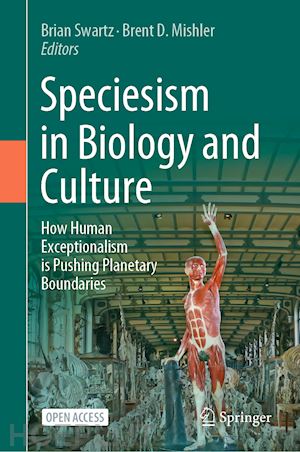

Questo prodotto usufruisce delle SPEDIZIONI GRATIS
selezionando l'opzione Corriere Veloce in fase di ordine.
Pagabile anche con Carta della cultura giovani e del merito, 18App Bonus Cultura e Carta del Docente
This open access book explores a wide-ranging discussion about the sociopolitical, cultural, and scientific ramifications of speciesism and world views that derive from it. In this light, it integrates subjects across the natural sciences, social sciences, and humanities.
The 21st-century western world is anthropocentric to an extreme; we adopt unreasonably self-centered and self-serving ideas and lifestyles. Americans consume more energy resources per person than most other nations on Earth and have little concept of how human ecology and population biology interface with global sustainability. We draw upon religion, popular culture, politics, and technology to justify our views and actions, yet remain self-centered because our considerations rarely extend beyond our immediate interests. Stepping upward on the hierarchy from “racism,” “speciesism” likewise refers to the view that unique natural kinds (species) exist and are an important structural element of biodiversity. This ideology manifests in the cultural idea that humans are distinct from and intrinsically superior to other forms of life. It further carries a plurality of implications for how we perceive ourselves in relation to nature, how we view Judeo-Christian religions and their tenets, how we respond to scientific data about social problems such as climate change, and how willing we are to change our actions in the face of evidence.
Part I. Biology and Culture.- Chapter 1. Speciesism in Biology and Culture: How Human Exceptionalism is Pushing Planetary Boundaries.- Chapter 2. Race and Human Genomic Variation.- Chapter 3. Science Without Species: Doing Science With Tree-Thinking.- Part II. Culture and History.- Chapter 4. The Colonization of Islands as Microcosms for Human Impacts on an Interplanetary Scale.- Chapter 5. Species, God, and Dominion.- Chapter 6. Symbols and How We Came to be Human.- Part III. Conservation and Law.- Chapter 7. Law and Nature: Human, Nonhuman, and Ecosystem Rights.- Chapter 8. A Phylogenetic Approach to Conservation: Biodiversity and Ecosystem Functioning for a Changing Globe.- Part IV. Sustainability and the Future.- Chapter 9. Energy and Society: Toward a Sustainable Future.
Brian Swartz is a scientist at the Millennium Alliance for Humanity and the Biosphere and the University and Jepson Herbaria (mahb.stanford.edu, ucjeps.berkeley.edu). His research focuses on speciesism and the global consequences of human self-interests. This includes fostering positive social and environmental outcomes that support a prosperous future for life on Earth. To this end he also works with entrepreneurs and investors in artificial intelligence, machine learning, extended reality, quantum computing, blockchain technology, DeFi, web3, and game design who hold a similar vision for the future. Brian was trained at Cambridge, Berkeley, Stanford, Harvard, Penn, and the Howard Hughes Medical Institute.











Il sito utilizza cookie ed altri strumenti di tracciamento che raccolgono informazioni dal dispositivo dell’utente. Oltre ai cookie tecnici ed analitici aggregati, strettamente necessari per il funzionamento di questo sito web, previo consenso dell’utente possono essere installati cookie di profilazione e marketing e cookie dei social media. Cliccando su “Accetto tutti i cookie” saranno attivate tutte le categorie di cookie. Per accettare solo deterninate categorie di cookie, cliccare invece su “Impostazioni cookie”. Chiudendo il banner o continuando a navigare saranno installati solo cookie tecnici. Per maggiori dettagli, consultare la Cookie Policy.